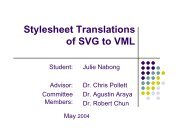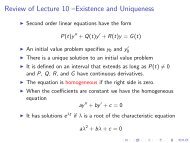Chapter 6: Inheritance and Abstract Classes Chapter Topics 6.1 ...
Chapter 6: Inheritance and Abstract Classes Chapter Topics 6.1 ...
Chapter 6: Inheritance and Abstract Classes Chapter Topics 6.1 ...
Create successful ePaper yourself
Turn your PDF publications into a flip-book with our unique Google optimized e-Paper software.
CS151 Object-Oriented Design<br />
Dr. Kim<br />
{ protected void protetedMethod()<br />
{ }<br />
}<br />
/* This doesn't compile.<br />
class FinalSubclass extends FinalClass<br />
{ }<br />
*/<br />
class ClassWithFinalMethods<br />
{ public static final void staticFinalMethod()<br />
{ }<br />
}<br />
class SubclassWithFinalMethods extends ClassWithFinalMethods<br />
{ /* This doesn't compile.<br />
public static void staticFinalMethod()<br />
{ }<br />
*/<br />
}<br />
6.3.3 Intent of using abstract classes<br />
An abstract class is being used in a class hierarchy when we need a base class for two or more<br />
actual classes that share some attributes <strong>and</strong>/or some behaviors. Consider the following example<br />
to learn the use of abstract classes.<br />
• The SceneShape Interface type that defines a number of operations that the shapes must<br />
carry out.<br />
public interface SceneShape<br />
{<br />
void setSelected(boolean b);<br />
boolean isSelected();<br />
void draw(Graphics2D g2);<br />
void drawSelection(Graphics2D g2);<br />
void translate(int dx, int dy);<br />
boolean contains(Point2D aPoint);<br />
}<br />
• <strong>Abstract</strong> classes are convenient placeholders for factoring out common<br />
behavior. Consider the following example to learn the use of abstract classes.<br />
public class CarShape implements SceneShape<br />
{ private boolean selected;<br />
...<br />
public void setSelected(boolean b) { selected = b; }<br />
15




